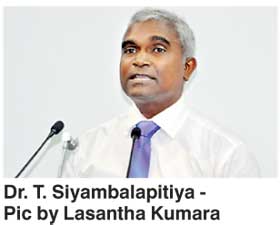Saturday Feb 21, 2026
Saturday Feb 21, 2026
Tuesday, 21 June 2016 00:44 - - {{hitsCtrl.values.hits}}
By Charumini de Silva
Sluggish power policies are putting Sri Lanka in danger of returning to high-cost thermal generation that could push power costs up by as much as 50%, a top expert warned yesterday.
Stagnating Government policies on power generation could lead to projects not being completed on time, noted energy expert Dr. Tilak Siyambalapitiya, which could result in ‘history repeating itself’.
He also called for fresh regulations including legal requirements for LNG and other types of power generation to be established as a  precursor to brining the technology into the country.
precursor to brining the technology into the country.
Dr. Siyambalapitiya warned Sri Lanka could face another power crisis by 2018, which would leave the Government to foot the bill. He also opined that the current focus on renewable energy sources would not be adequate to forestall any future power shortages.
Dr. Siyambalapitiya told a seminar on ‘Generation options for Sri Lanka for a relievable and an economical power supply’ organised by the Institution of Engineers of Sri Lanka (IESL) that implementation delays would drive up costs.
“Developing a project and getting it implemented is a million times more difficult than sitting in a room and cancelling a project. Cancelling a project is a further 100 times easier, if you do not know the subject and in any case, would not be responsible for the consequences.”
Dr. Siyambalapitiya insisted that vested interests could creep into the policy-making process and side-line the Ceylon Electricity Board (CEB).
“The Sampur 500MW coal power plant was due in 2016 but was rescheduled to 2020; now it is indefinitely delayed. A 20MW wind power plant is now suspended and there is no sign of any competitive process for solar. Basically, all power generation projects, especially those that would reduce costs, are presently cancelled or suspended by these committees,” he added.
According to the 2020 plan by Public Utilities Commission of Sri Lanka (PUCSL), estimate cost for a unit of electricity at the point of production for fuel was only Rs. 7.38. However, by 2020 the production of cost will unit would reach almost Rs. 11, thereby amounting to an increase of almost 50%.
“The way things are taking place, this situation is almost inevitable. Get ready to pay higher electricity bills. This is just a moderate estimate, things could become much worse,” he cautioned.
Belief LNG will be of similar cost to coal but more environmentally friendly, unfavourable Power Purchasing Agreements (PPAs) and the Government not understanding the sector were highlighted as policy confusion points by the expert.